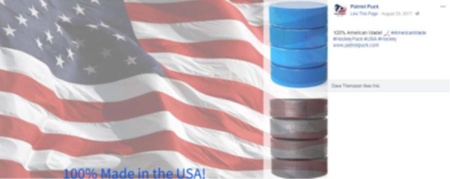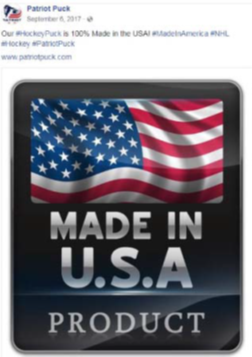In two Federal Trade Commission cases, companies selling hockey pucks and companies selling recreational and outdoor equipment agreed to stop making false “Made in USA” claims. Four related Farmingdale, New York-based companies doing business as Patriot Puck, and their officer, have agreed to stop making false claims that the hockey pucks they sell are all, or virtually all, made in the United States. Also, two commonly controlled California companies that sell recreational and outdoor equipment have agreed to stop making false, misleading, and unsupported “Made in USA” claims about their products.
What the FTC Did to Protect Consumers
In the Patriot Puck matter, the FTC’s complaint, which names George Statler III as an officer of all the companies, alleges Patriot Puck markets hockey pucks -- through its website, patriotpuck.com, and elsewhere online -- to customers throughout the United States. According to the complaint, Patriot Puck’s claims in its advertising, packaging, and promotional materials include “Made in America,” “Proudly Made in the USA,” “100% American Made!” and “The only American Made Hockey Puck!”.
The FTC alleges that, in fact, Patriot Puck’s hockey pucks are wholly imported from China. Since January 2016, Statler and the companies doing business as Patriot Puck – which include Underground Sports Inc., Hockey Underground Inc., Ipuck Inc. and Ipuck Hockey Inc. – have imported 74,411 kilograms of hockey pucks, which is the equivalent of more than 400,000 standard-weight pucks, the complaint states.
[Complaint Exhibit A, Patriot Puck website]

[Complaint Exhibit C, Patriot Puck Facebook posting]

[Complaint Exhibit E, Patriot Puck Facebook posting]

In the matter involving California companies Sandpiper of California, Inc. and PiperGear USA, Inc., the FTC’s complaint alleges that the companies claimed in advertisements, product labels, and promotional materials, and on company websites and social media, that their backpacks, travel bags, wallets, and other products are all or virtually all made in the United States.
But more than 95 percent of Sandpiper’s products are imported as finished goods, and approximately 80 percent of PiperGear’s products either are imported as finished goods, or contain significant imported components. According to the complaint, in some wallets imported as finished goods, the companies hid truthful country-of-origin information on the back of tags, and inserted cards that prominently displayed false U.S.-origin claims.
Sandpiper and PiperGear market their products -- which also include tactical gear and personal security items -- throughout the United States, according to the complaint. Much of their allegedly false promotional material appeals to consumers’ patriotism. For example, Exhibit D is a Sandpiper logo that includes an American flag and the claim “U.S. Made By S.O.C.” (Sandpiper of California).
Similarly, according to the complaint, Sandpiper’s website states: “Featuring American Made products developed and manufactured by our sister company, PiperGear USA.”
[Exhibit D]

What the Settlements Mean
Under the terms of the proposed settlement orders, Statler and the four Patriot Puck companies, as well as Sandpiper and PiperGear, are prohibited from making unqualified U.S.-origin claims for their products, unless they can show that the products’ final assembly or processing -- and all significant processing -- take place in the United States, and that all or virtually all ingredients or components of the product are made and sourced in the United States.
Under the orders, any qualified Made in USA claim must include a clear and conspicuous disclosure about the extent to which the product contains foreign parts, ingredients, and/or processing. To claim that a product is assembled in the United States, the respondents in both cases must ensure that it is last substantially transformed in the United States, its principal assembly takes place in the United States, and United States assembly operations are substantial.
The orders also prohibit the respondents from making untrue, misleading, or unsubstantiated country-of-origin claims in their marketing materials about any product or service.
In a related matter, following a public comment period, the Federal Trade Commission has approved a final consent order settling charges that California-based Nectar Brand LLC made false claims that its Chinese-made mattresses are assembled in the United States.
First announced in March 2018, the FTC’s complaint against Nectar Brand LLC alleged that the company falsely claimed its mattresses are “Designed and Assembled in the USA,” but in fact, the mattresses are wholly imported from China, with no assembly taking place in the United States.
No comments:
Post a Comment